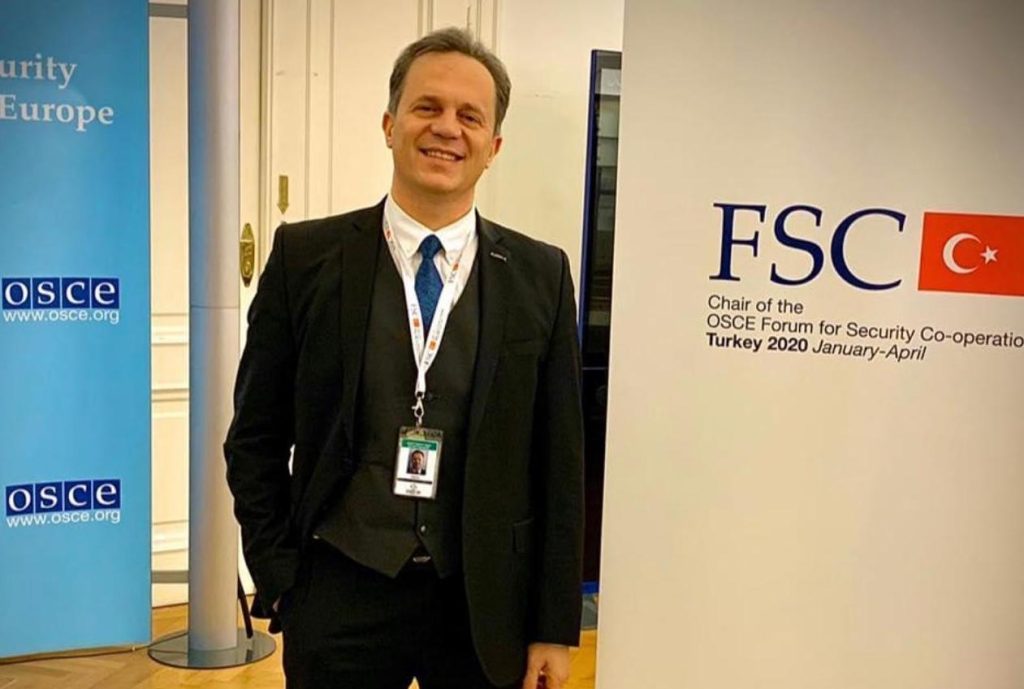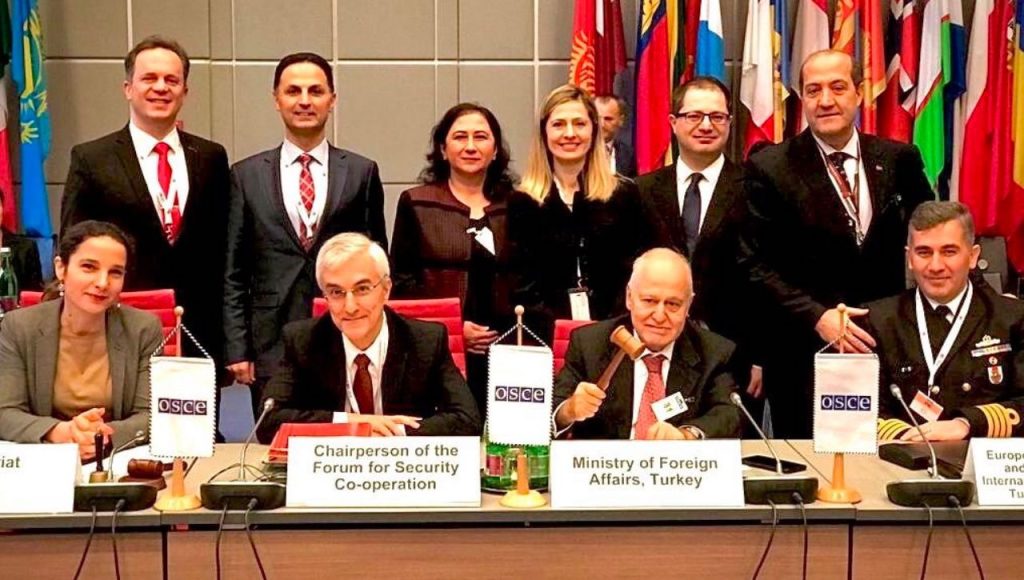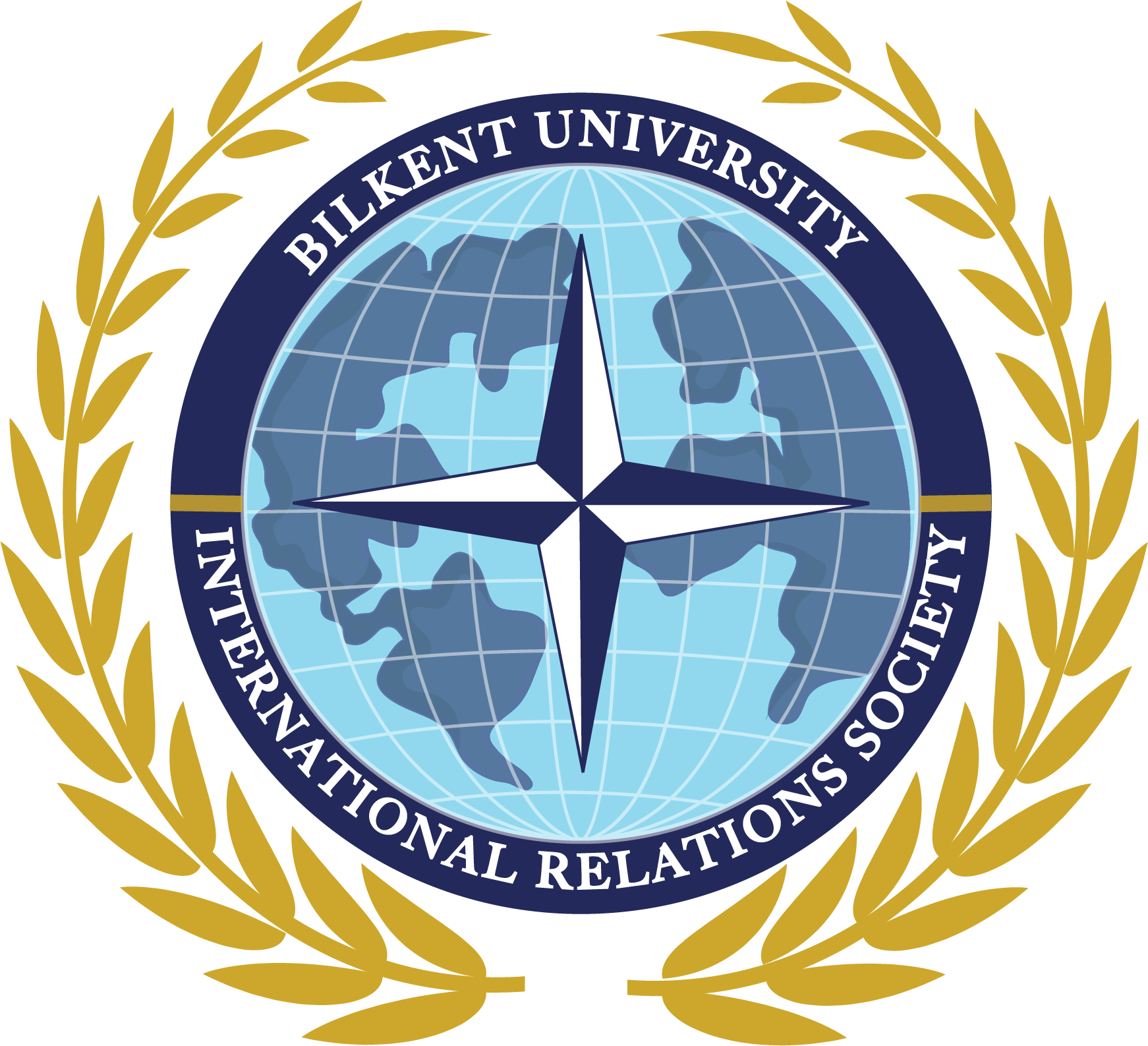Interviewer / Author: İbrahim Polat Topcu
Interviewee: Ali Kul
Interview Location: Sıhhiye Officer’s Club, Ankara, Türkiye
Interview Date: 17.03.2024
Colonel Dr. Ali Kul was born in 1974. He graduated as an engineer and soldier from the Turkish Military Academy in 1996. He received his master’s degree and Ph.D. in business administration in 2003 and 2019. He worked in various positions such as a commander in the Turkish army, lecturer at the Turkish Military Academy, supply officer and logistic advisor on behalf of Türkiye in the NATO office, Turkish representative in the Organization for Security and Co-operation in Europe (OSCE), and the head of the logistics department in the Turkish Ministry of National Defense. He retired in 2023. In this interview, we focus on Colonel Kul’s memorials during his tenure as the Turkish representative in OSCE between 2017 and 2020. With this interview, we hope to provide some practical information to undergraduate students who desire to continue their careers as diplomats.
OSCE is a security organization that aims to provide peace within Europe. Fifty-seven countries are part of this organization, including major powers like the U.S. and Russia. Its headquarter is located in Vienna, Austria. Unlike NATO, OSCE does not possess a military power. Its capabilities are limited to only observatory means. Rauf Engin Soysal was the appointed diplomat by the Turkish Ministry of Foreign Affairs to represent Türkiye in OSCE. Alongside Ambassador Soysal, Colonel Kul was appointed by the Turkish Ministry of National Defense to Vienna as the representative of the Turkish military. Colonel Kul states that one of the biggest challenges he faced during his tenure was the lack of previous preparation regarding his duty. “Diplomacy requires communication with symbols and sub-meanings, and I had little idea about it before. I did not receive any preparations regarding that type of special communication.”
Colonel Kul explains the reason for the lack of proper preparations from the Ministry of National Defense or the previous Turkish military representatives. As his mission took place right after the failed coup initiative in 2016, which was conducted by a group of terrorists who infiltrated into the Turkish military, he claims that conditions were not sufficient for a preparation process. “Other representatives of nations in OSCE and previous Turkish representatives were prepared for a decent amount of time. But the previous representatives before me fled since they were part of the terrorist group that initiated the coup attempt. Thus, I had no one over there to inform me about my job. I had to start from scratch to learn everything that was needed.”
To understand the effects of the coup d’etat initiative regarding Türkiye’s position in the OSCE, we ask Colonel Kul if the representatives of other nations asked questions about the coup initiative during his tenure. His answer was the following: “I felt the urge and need to tell everything about the reality of the coup initiative, that the actual army was not responsible for it, but rather it was a terrorist group who infiltrated into the army. But to my surprise, they did not ask even one question about it. They were ignoring it like it had never happened. The subject was not taken as the main focus.” As he continues with his answer, Colonel Kul provides information about the general attitudes of diplomats. “To act like a diplomat, you must have a poker face. You may know everything, but sometimes you shall not talk. There exist some topics that should not be taken into consideration at the moment. I remember that once, during my tenure, I wanted to start a conversation about the instant plunge down of the Russian Ruble. At the meeting, I directly asked to the Russian representative, ‘What is happening with Ruble nowadays?’ Suddenly, the American Ambassador stopped me and said the current situation of Ruble was not the main focus at the moment. Thus, their ‘ignorant’ act towards the coup initiative in Türkiye was not special.”
To return to the challenges he faced during his tenure, Colonel Kul claims that working with experienced diplomats from other nations was a huge challenge. He shares his following memory with an experienced Russian diplomat, Anton Mazur: “I once encountered Ambassador Mazur in an elevator in the Hofburg Palace [1]. ‘You should be the young Turkish diplomat,’ he said. We engaged in a short conversation where he said, ‘I like young Turkish diplomats because the old ones are a little bit rough and rigid, not as flexible as you.’” Indeed, one might consider Ambassador Mazur’s statement as a complement to Colonel Kul. Nevertheless, the truth was different. “In fact,” Colonel Kul explains, “Ambassador Mazur was trying to send a message to my superior, Ambassador Soysal, through me. I believe I do not need to explain the obvious message of the Russian Ambassador.”
Colonel Kul provides another challenge he faced, which contained a dangerous situation: “At the time, the majority of our discussions in OSCE were related to the Azerbaijani-Armenian conflict. While every country had a right to speak for only one or two minutes, Armenia and Azerbaijan had the right to speak for at least one hour. As Türkiye, we were explicitly supporting Azerbaijan. In one of these meetings, an Armenian representative took the floor and accused Türkiye of being prejudiced due to its constant support for Azerbaijan. As a response, I took the floor to indicate that Turkish support for Azerbaijan was very similar to Russian support for Armenia, and both were very understandable. My answer made the Armenian representative very furious. After the meeting, the Azerbaijani representative approached and told me that several Armenian officials were waiting for me outside and that it might be dangerous for me. I left the room with the escort of five to seven Azerbaijani officers from the Azerbaijani Ministry of Foreign Affairs to ensure my safety.”
As we approach our interview’s end, Colonel Kul provides information about the uncooperative Russian attitude. “Under normal circumstances, if one nation desires to coordinate military exercises, it has to inform OSCE about it. It is perceived as a way to establish proper communication and trust between actors. The details must contain the location and the number of officers assigned to the exercise. Countries can even invite foreign representatives for them to observe the exercise to establish further trust. But when it came to Russia, it had always provided missing information about its military exercises. Indeed, it was on purpose, it was their tactic. If you pay attention, you will notice that the Russian invasion of Crimea in 2014 started as a ‘military exercise’ that was misguidedly reported to OSCE.”
In our interview, we lastly focus on the funny experiences that can occur due to language barriers. When we ask Colonel Kul if he had ever experienced such a situation, his answer is negative, but he had witnessed one of his co-workers experiencing it. “It was one of our jobs to attend joyful receptions, where we can taste various wines and cheese. In one of such receptions, my co-worker was trying to communicate with the other military personnel of other nations. You know, Turkish people often think Turkish when they speak English. They simultaneously try to translate their inner thoughts before speaking. In such a moment, my co-worker told the other representative, ‘Last night, we slept with Colonel Kul together.’ Indeed, he was only trying to say we shared the same room to spend the night, but his thought process was in Turkish [2].” Turkish people thinking in Turkish before speaking in English is expressed by Cem Yılmaz, who is a famous comedian, in one of his stand-ups. The renowned quote “little, little; into the middle” will sound familiar to our readers [3].
It was a delightful experience for us to host Colonel Ali Kul in this interview. We hope our readers enjoyed the memorials of Colonel Kul and that those experiences were helpful for students who wish to become diplomats after graduation.


Footnotes:
[1] Hofburg Palace was the imperial palace of the Habsburg dynasty. The Palace was built in the 13th century and expanded as time passed for centuries. Starting from 1946, the Palace started to be used as the official residence of the President of Austria.
[2] Colonel Kul adds that his co-worker was later sentenced due to his connection to the terrorist group who infiltrated into the Turkish military. Colonel Kul claims that the incident he expressed was one of the indicators of the fact that he was not chosen for his duty based on his merit but due to his vicious connections.
[3] Here is the YouTube link for the mentioned stand-up: https://www.youtube.com/watch?v=V-xdyCAS610.




Leave a Reply